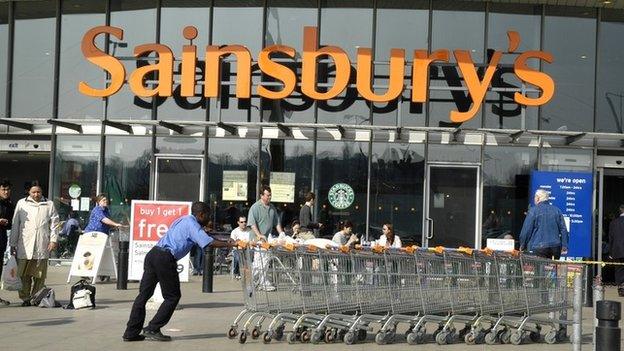Shopping around
- Published

Britain's supermarkets continue to feel the pain from having to adapt to our changing behaviour.
Sainsbury's was the most recent one to report falling sales.
And because big warehouse supermarkets are less profitable than they were - indeed, they're becoming something of a burden - its out-of-town real estate has been written down in value, registering a loss.
With its latest results, Sainsbury's has offered an interesting insight into how those shopping habits are changing.
It says consumers became more savvy through the downturn. They managed household budgets more carefully, with more frequent shops and less waste.
Supermarkets have provided us with more convenience stores because, well, they're more convenient, with reliable stock, which is why we're using them more.
And for the bigger shops with bulkier items, customers have gained in confidence about online shopping and delivery.
Sainsbury's says the supermarket will remain dominant. It cites forecasts that suggest, seven years from now, 60% of spend will remain at the bigger format of store.
But economic recovery has moved things on from the downturn years.
Customers are taking advantage of lower prices, but are also shopping with more confidence about their household budgets.
They're indulging in the treats on which they missed out over recent years - "like eating out more frequently and purchasing big ticket items for the home".
That trend has also fed through to changes in the restaurant business, as McDonald's, for instance, struggles to adapt to the growing casual dining experience of Nando's.
A bit more spending power may also explain the latest retail industry figures, showing the growth of Lidl and Aldi sales, while still much stronger than others, has been slowing down.
Kantar reports that, in the 12 weeks to the end of April, Aldi sales were up 15% to a 5.4% share of the retail multiples takings, with Lidl up 10% to 3.8%.
The biggest loser in these latest rankings was Asda, heavily dependent on huge out-of-town stores for the big family shop - down 2.2% in takings since last year. Its market share fell below 17%, only just ahead of Sainsbury's.
Tesco's sales also fell 1%, with its problems well documented. But it remains king, on a share of more than 28%.
Express check-out
With the move to convenience stores, supermarkets are differentiating between the price-driven family shop and the impulse buy of a sandwich, which turns out to be less price sensitive than most other products.
Likewise with flowers for Valentine's Day.
With fresh product, people are willing to pay for freshness and quality. (Incidentally, Greene King pubs reported this week an 150% increase in Prosecco sales on Valentine's Day).
Morrisons also let us peek into some industry intelligence with its most recent figures.
It cited market research which shows the average British shopping basket now contains 11 items, it costs £15, and there are five such visits each week.
That's bad news for Morrisons, which was late into convenience stores, and has already admitted that it's got them wrong, so has called a halt.
That insight was as it announced a return to staffed express check-outs.
It has realised that customers are looking for value, and shopping around for it. But having found it, they want the personal touch of a real person to relieve them of their cash.
That's a bit confusing for those poor supermarket strategists, as they figure out how to slash prices with lower costs, but have to provide better customer service.
And in the face of so much more shopping around for value, the conclusion reached by Sainsbury's is that they need to build more customer loyalty, including the opportunity to cross-sell away from food.